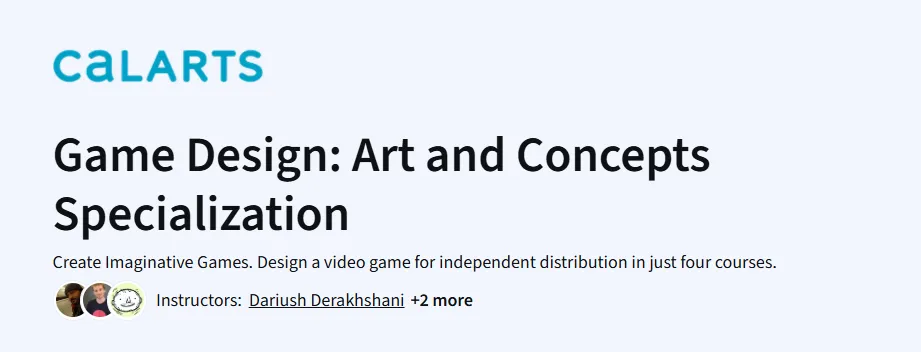What will you learn in Game Design: Art and Concepts Specialization Course
Understand the core principles of game design from concept to execution.
Design paper and digital prototypes that test mechanics and gameplay.
Build interactive games using Unity and other tools.
Analyze the psychology behind player experience, engagement, and storytelling.
Program Overview
Course 1: Introduction to Game Design
⏱️ 4 weeks
Topics: Game systems, rules, playtesting, game design history.
Hands-on: Design a paper prototype and test game mechanics.
Course 2: Principles of Game Design
⏱️ 4 weeks
Topics: Player experience, progression, feedback loops.
Hands-on: Analyze games and iterate on your own designs.
Course 3: Game Design Document: Define the Art & Concepts
⏱️ 4 weeks
Topics: Character creation, worldbuilding, visual storytelling.
Hands-on: Create your own Game Design Document (GDD).
Course 4: Prototyping and Iteration
⏱️ 4 weeks
Topics: Rapid prototyping, user testing, iteration cycles.
Hands-on: Build a playable digital prototype.
Course 5: Game Design: Capstone Project
⏱️ 4 weeks
Topics: Team collaboration, polish, presentation.
Hands-on: Finalize and present your complete game design.
Get certificate
Job Outlook
Game design is projected to grow with the expanding gaming industry.
Career paths include game designer, level designer, UX designer, and narrative designer.
Salaries range from $50,000 to $120,000+ based on role and experience.
Independent and freelance game development are also viable paths.
Specification: Game Design: Art and Concepts Specialization
|
FAQs
- No prior coding or design experience required.
- Focuses on game design principles from concept to playable prototype.
- Suitable for aspiring game designers, artists, and storytellers.
- Emphasizes creativity, iteration, and player experience.
- Hands-on exercises include paper and digital prototypes.
- Covers character creation, worldbuilding, and visual storytelling.
- Guides students to define gameplay mechanics, systems, and narratives.
- Includes exercises for documenting art, mechanics, and player interactions.
- Helps organize ideas for professional presentation or portfolio use.
- Prepares learners to collaborate effectively in game development.
- Build both paper and digital prototypes to test gameplay mechanics.
- Learn rapid iteration cycles based on player feedback.
- Analyze user experience, engagement, and pacing.
- Focus on refining design for functional and enjoyable games.
- Prepares learners for real-world game development workflows.
- Prepares for roles like game designer, level designer, UX designer, and narrative designer.
- Enhances portfolio with capstone project showcasing your game design skills.
- Supports freelance and independent game development opportunities.
- Builds skills in collaboration, presentation, and project management.
- Offers industry-relevant tools and techniques for game design.
- 5 courses: Introduction, Principles, Game Design Document, Prototyping & Iteration, Capstone Project.
- Each course takes ~4 weeks at a moderate pace.
- Self-paced with lifetime access.
- Certificate awarded upon completion of all courses.
- Total duration: ~20 weeks for the full specialization.





